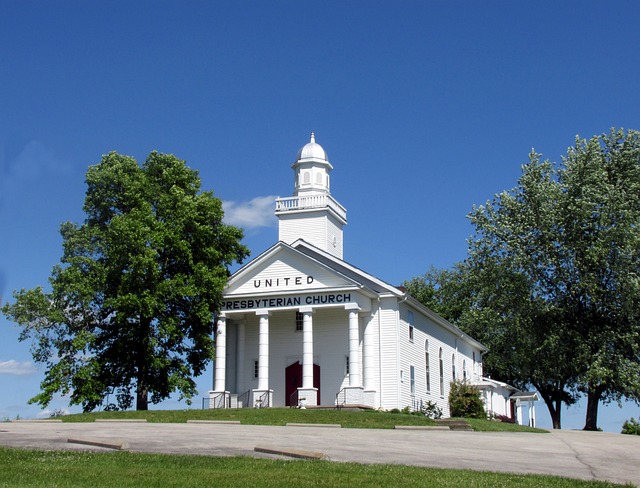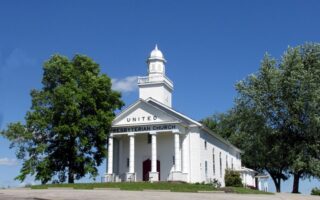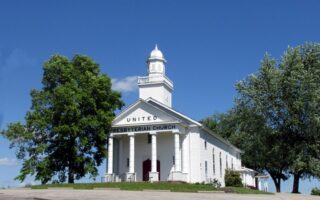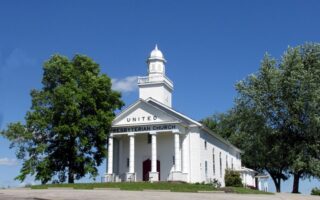Presbyterians do not have priests in the traditional sense. Instead, they have ministers who are ordained to serve as spiritual leaders and shepherds within their congregations.
Table of Contents
The Role of Ministers in Presbyterian Churches
Do Presbyterians have priests? This is a common question that often arises when discussing the role of ministers in Presbyterian churches. The answer, however, is not as straightforward as one might think. While Presbyterians do have ministers, they do not have priests in the traditional sense.
In Presbyterian churches, the role of the minister is to serve as a spiritual leader and guide for the congregation. They are responsible for preaching the Word of God, administering the sacraments, and providing pastoral care to the members of the church. Unlike priests in other denominations, Presbyterian ministers do not have the power to perform certain sacraments, such as the Eucharist or confession.
The reason for this distinction lies in the theological beliefs of the Presbyterian tradition. Presbyterians adhere to a form of church governance known as Presbyterianism, which is characterized by a system of representative democracy. This means that decisions within the church are made collectively by a body of elders, rather than by a single priest or bishop.
In Presbyterian churches, ministers are ordained by a presbytery, which is a group of elders from the local area. This ordination is seen as a recognition of the individual’s calling to ministry and their qualifications for the role. It is not, however, a sacrament that imparts any special powers or authority.
Instead of priests, Presbyterians believe in the priesthood of all believers. This means that every member of the church has a direct relationship with God and is called to serve and minister to others. While ministers may have a more formal role in leading worship and providing pastoral care, they are not seen as intermediaries between God and the congregation.
This emphasis on the priesthood of all believers is reflected in the structure of Presbyterian worship services. In Presbyterian churches, the congregation plays an active role in worship, with members participating in prayers, readings, and hymns. This participatory approach highlights the belief that all believers have a role to play in the worship of God.
While Presbyterians do not have priests, they do have a strong tradition of ordination and the recognition of ministers as spiritual leaders. The role of the minister is seen as one of service and leadership, rather than one of hierarchy or authority. Ministers are called to shepherd the flock, to teach and preach the Word of God, and to provide pastoral care to the congregation.
In conclusion, while Presbyterians do not have priests in the traditional sense, they do have ministers who serve as spiritual leaders and guides for the congregation. The role of the minister is one of service and leadership, rather than one of hierarchy or authority. Presbyterians believe in the priesthood of all believers and emphasize the active participation of the congregation in worship. So, while the terminology may be different, the role of the minister in a Presbyterian church is similar to that of a priest in other denominations.
Understanding the Presbyterian Church Government Structure

Do Presbyterians have priests? This is a common question that many people have when it comes to understanding the Presbyterian Church government structure. The answer, however, is not as straightforward as one might think. To fully grasp the concept, it is important to delve into the history and beliefs of the Presbyterian Church.
The Presbyterian Church is a Protestant Christian denomination that traces its roots back to the Reformation in the 16th century. It was founded by John Calvin, a French theologian, who believed in the sovereignty of God and the authority of Scripture. The Presbyterian Church is known for its emphasis on the priesthood of all believers, which means that every member of the church has a role to play in the ministry.
Unlike some other Christian denominations, such as the Roman Catholic Church, Presbyterians do not have a hierarchical structure with priests at the top. Instead, they have a system of church government that is based on the principles of representative democracy. This means that decisions are made by elected representatives, known as elders, who are chosen by the congregation.
In the Presbyterian Church, the highest governing body is called the General Assembly. This is made up of representatives from each individual congregation, as well as ministers and elders. The General Assembly meets annually to discuss and make decisions on matters of doctrine, worship, and church government. It is important to note that while ministers play a significant role in the Presbyterian Church, they are not considered to be priests in the traditional sense.
So, if Presbyterians do not have priests, what do they have? The answer lies in the role of the minister. In the Presbyterian Church, ministers are ordained to serve as spiritual leaders and shepherds of the congregation. They are responsible for preaching the Word of God, administering the sacraments, and providing pastoral care to the members of the church. While they may perform some functions that are traditionally associated with priests, such as baptisms and weddings, they do not have the same sacramental authority as priests in other denominations.
Another important aspect of the Presbyterian Church government structure is the role of the session. The session is a group of elders who are responsible for the spiritual oversight and governance of an individual congregation. They work closely with the minister to make decisions on matters such as worship, education, and outreach. The session is accountable to the presbytery, which is a regional governing body made up of representatives from several congregations.
In conclusion, while Presbyterians do not have priests in the traditional sense, they do have ministers who serve as spiritual leaders and shepherds of the congregation. The Presbyterian Church government structure is based on the principles of representative democracy, with decisions being made by elected representatives known as elders. This emphasis on the priesthood of all believers highlights the importance of every member of the church in the ministry. So, the next time someone asks if Presbyterians have priests, you can confidently explain the unique structure and beliefs of the Presbyterian Church.
Comparing Presbyterian and Catholic Approaches to Clergy
Do Presbyterians have priests? It’s a common question that arises when comparing Presbyterian and Catholic approaches to clergy. While both denominations have individuals who serve in leadership roles within their respective churches, the titles and roles they hold can differ significantly.
In the Catholic Church, priests play a central role in the sacraments, particularly in the celebration of the Eucharist. They are ordained through a sacramental process and are believed to have the power to consecrate bread and wine, transforming them into the body and blood of Christ. This belief is known as transubstantiation. Additionally, priests are authorized to hear confessions and grant absolution, administer the sacrament of Anointing of the Sick, and perform other sacred rituals.
On the other hand, Presbyterians do not have priests in the same sense as Catholics. Instead, they have ministers who are ordained to serve as spiritual leaders within their congregations. These ministers are often referred to as pastors or elders. While they may perform many of the same functions as Catholic priests, such as preaching, teaching, and administering sacraments, their authority is derived from the congregation rather than from a sacramental ordination.
The Presbyterian approach to clergy is rooted in the belief in the priesthood of all believers. This means that every member of the congregation is considered a priest in their own right, with direct access to God and the ability to serve and minister to others. The role of the minister is to equip and empower the congregation to fulfill their priestly duties, rather than acting as an intermediary between God and the people.
This distinction in terminology and roles can be seen in the way Presbyterian and Catholic churches are structured. In a Catholic church, the priest is often seen as the central figure, leading the congregation in worship and performing the sacraments. In contrast, Presbyterian churches are typically governed by a session, which is made up of elders elected by the congregation. The minister serves as a member of the session, providing spiritual guidance and leadership, but decisions are made collectively by the elders and the congregation as a whole.
While the Presbyterian approach may seem less hierarchical than the Catholic model, it is important to note that both denominations value the importance of ordained leadership within their churches. In both cases, ministers and priests undergo a rigorous process of education, training, and examination before being ordained. They are expected to be knowledgeable in theology, skilled in pastoral care, and committed to serving their congregations.
In conclusion, the question of whether Presbyterians have priests is a nuanced one. While they do not have priests in the same sacramental sense as Catholics, they do have ministers who serve as spiritual leaders within their congregations. The Presbyterian approach to clergy is rooted in the belief in the priesthood of all believers, emphasizing the role of every member of the congregation in serving and ministering to others. Both denominations value the importance of ordained leadership, but the titles and roles they hold can differ significantly.
Exploring the Historical Development of Presbyterian Ministry
Do Presbyterians have priests? This is a question that often comes up when discussing Presbyterianism and its unique approach to ministry. To answer this question, we need to delve into the historical development of Presbyterian ministry and understand how it differs from other Christian denominations.
In Presbyterianism, the concept of priesthood is not emphasized in the same way as it is in other Christian traditions. Instead, the focus is on the role of elders and ministers within the church. This emphasis on the priesthood of all believers is rooted in the teachings of the Protestant Reformation, which sought to empower the laity and diminish the hierarchical structure of the Catholic Church.
The Presbyterian Church traces its roots back to Scotland in the 16th century, where John Knox and other reformers sought to establish a church that was governed by elders rather than bishops. This model of church governance, known as Presbyterian polity, places a strong emphasis on the authority of the local congregation and the role of elders in decision-making.
In Presbyterianism, ministers are ordained to serve as spiritual leaders and shepherds of the congregation. They are responsible for preaching the Word of God, administering the sacraments, and providing pastoral care to the members of the church. While they may perform some functions that are traditionally associated with priests, such as presiding over the Lord’s Supper, they are not considered to be priests in the same sense as in Catholicism or Anglicanism.
The role of elders in Presbyterianism is also significant. Elders are elected by the congregation and serve alongside the minister in the governance of the church. They are responsible for providing spiritual leadership, exercising discipline, and making decisions on behalf of the congregation. In this sense, they share in the ministry of the church alongside the minister, but they are not ordained in the same way as ministers.
This emphasis on the priesthood of all believers is a key aspect of Presbyterian theology. It reflects the belief that all Christians have direct access to God and can serve as ministers of the Gospel in their own right. This egalitarian approach to ministry is seen as a reflection of the biblical teaching that all believers are part of a royal priesthood.
While Presbyterianism does not have priests in the traditional sense, it does have a rich tradition of ordained ministry. The Presbyterian Church recognizes the importance of a trained and educated clergy who can provide sound teaching and leadership to the congregation. Ministers are typically required to complete a course of study at a theological seminary and undergo a period of practical training before being ordained.
In conclusion, while Presbyterians do not have priests in the same way as other Christian denominations, they do have a unique approach to ministry that emphasizes the priesthood of all believers. The role of ministers and elders in Presbyterianism is to provide spiritual leadership and guidance to the congregation, but they are not considered to be priests in the traditional sense. This emphasis on the priesthood of all believers reflects the egalitarian nature of Presbyterian theology and the belief that all Christians have a role to play in the ministry of the church.
Conclusion
No, Presbyterians do not have priests.


